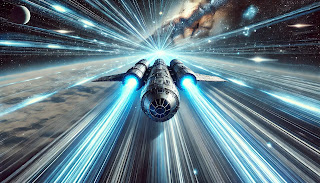Elements of the Science Fiction Genre
Introduction to the Science Fiction Genre
Science fiction is the literature of tomorrow, the art of imagining what lies just beyond the veil of the present. It bends the known into the unknown, crafting narratives that traverse alien landscapes, simulate uncharted technologies, and dive into the heart of philosophical quandaries. At its core, science fiction isn’t just about rockets and robots—it’s a genre that questions, predicts, warns, and wonders. This exploration walks through its foundational elements, the craft of worldbuilding, its recurring themes, and its powerful resonance with the human condition.
A Brief History of Science Fiction
Though its modern form emerged in the 19th century, science fiction’s roots run deep—stretching back to mythic tales of sky-chariots and moon journeys. In the industrial age, visionaries like Jules Verne and H.G. Wells transformed wonder into genre, fusing scientific theory with narrative art. The 20th century saw it flourish—on page, screen, and beyond—shaping imaginations with each new leap into the speculative. Today, it stands not only as entertainment but as prophecy, caution, and reflection.
Core Elements of a Science Fiction Story
-
Technological Marvels
Whether it's sentient algorithms or warp-speed engines, futuristic technology is often the engine of the sci-fi narrative. It allows authors to explore how innovation reshapes society, relationships, and identity. -
Alien Civilizations
Science fiction revels in the unknown. Alien beings, whether benevolent or hostile, often serve as mirrors—reflecting our hopes, fears, and cultural assumptions back at us. -
Space Exploration
Space is the genre’s grand canvas. Interstellar voyages, cosmic mysteries, and galactic frontiers ignite the reader’s sense of adventure—and humility in the face of the universe’s vastness.
The Art of Worldbuilding in Science Fiction
-
Inventive Settings
A well-built sci-fi world transports. From rusting spaceports orbiting gas giants to glittering cities ruled by AI councils, settings in this genre are both immersive and symbolic. -
Social Structures and Cultural Norms
Science fiction dares to imagine how societies evolve under pressure. It examines governance without borders, economies driven by information, and morals shaped by synthetic sentience. -
Imagined Technologies
The tech of science fiction is never just backdrop—it defines reality. From mind-uploading machines to nanobot swarms, these inventions challenge our assumptions about life, power, and what it means to be human.
Themes and Concepts That Define the Genre
-
Time Travel
A classic sci-fi trope that plays with causality and destiny. Time travel narratives often ask: if you could change the past, should you? And what is the cost? -
Dystopian Realities
From climate collapse to authoritarian futures, dystopias warn us of paths we may be heading down. These stories are alarms disguised as fiction. -
Artificial Intelligence
What happens when machines think—and feel? Sci-fi grapples with the ethics of creation, the limits of consciousness, and the possibility that our successors may not be human.
Character Development in Sci-Fi Narratives
-
Complex Protagonists and Antagonists
In science fiction, characters are rarely black and white. AI villains who just want freedom. Human heroes who doubt their humanity. The genre thrives in the grey areas. -
Evolution in Futuristic Contexts
Sci-fi protagonists often undergo radical internal change. Whether altered by alien contact or emerging tech, their arcs echo the real-world tension between progress and preservation. -
Reflections of Human Nature
Despite its cosmic scope, science fiction always returns to its central subject: us. It holds a mirror to our best hopes, worst impulses, and everything in between.
Subgenres That Expand the Sci-Fi Universe
-
Cyberpunk
Gritty, neon-lit, and rebellious—cyberpunk dissects capitalism, surveillance, and digital identity. It's high tech meets low life. -
Space Opera
Epic, romantic, and sweeping, space operas bring adventure and grandeur to the stars. Think galaxy-spanning wars, ancient alien prophecies, and heroic destinies. -
Hard Science Fiction
Rooted in scientific realism, this subgenre leans on astrophysics, biology, and mathematics to build plausible futures. It's where storytelling meets precision.
The Genre’s Impact on the Real World
-
Driving Innovation
Sci-fi has inspired everything from smartphones to space travel. Ideas born in fiction often find their way into labs, startups, and eventually, everyday life. -
Social and Political Commentary
The genre excels at using metaphor to critique the present. Racism, climate change, authoritarianism—science fiction tackles them all through otherworldly lenses. -
Inspiring New Generations
For every scientist, engineer, or explorer, there's often a sci-fi story that lit the spark. The genre doesn’t just dream about the future—it builds it.
Conclusion: Why Science Fiction Endures
Science fiction is a genre of echoes and signals—speaking both to our deepest fears and our brightest dreams. It asks: What if? What next? And what are we becoming? Whether it’s voyaging across distant galaxies or peering into our own digitally-altered souls, science fiction remains an ever-evolving dialogue between the present and what lies just ahead. It is a genre not of answers, but of beautifully dangerous questions.
Frequently Asked Questions (FAQ)
What sets science fiction apart from other genres?
Science fiction stands out through its exploration of the future, the speculative, and the scientifically possible. It interrogates how change—technological, cosmic, or cultural—reshapes the human experience.
What are the main subgenres of science fiction?
Popular subgenres include cyberpunk (tech meets dystopia), space opera (epic space adventures), and hard science fiction (scientifically grounded narratives). Each offers a unique lens through which to explore the unknown.
How has science fiction shaped the real world?
From influencing technological breakthroughs to shaping social movements, science fiction often predicts—and even provokes—the future. It doesn’t just reflect culture; it challenges it to evolve.

.jpg)
.jpg)



Comments
Post a Comment
Your Thoughts, Please!
Have an opinion? A question? Or just want to share your random thoughts? Drop a comment below—we’d love to hear from you!